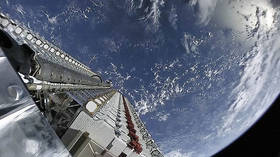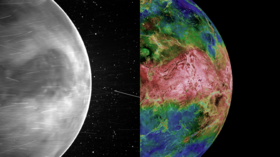NASA worried about Starlink Gen2 deployment

NASA expressed concern regarding SpaceX’s plan to deploy more satellites for its Starlink Gen2 project, in a letter submitted on Monday to the Federal Communications Commission (FCC). The space agency listed the potential risks the Starlink satellites could pose for space launches and observations, including collisions with other spacecraft, failure of maneuvering capability, interference with telescopes, and launch delays.
“NASA has concerns with the potential for a significant increase in the frequency of conjunction events and possible impacts to Nasa’s science and human spaceflight missions,” the agency stated.
NASA noted that there are 25,000 objects currently being tracked in the Earth’s orbit, including 6,100 objects at an altitude below 600km. The Starlink expansion “would more than double the number of tracked objects in orbit and increase the number of objects below 600 km over five-fold,” according to the agency.
Other companies, such as Amazon and a broadcast company Dish Network, have separately expressed fears regarding the SpaceX satellite network’s expansion.
Amazon.com, which committed to building more than 3,000 broadband connection satellites for at least $10 billion as part of the Kuiper System program, claimed that “at least hundreds—and potentially more than ten thousand—SpaceX satellites could operate at the same altitudes as the Kuiper System.”
The company stated that this interference could have a dramatic effect on their own satellite system, and urged the FCC to take action and set “reasonable conditions” for SpaceX’s project.
Last April, Elon Musk’s SpaceX received FCC authorization to deploy nearly 12,000 satellites offering broadband satellite connection for users worldwide. The authorization was granted, despite objections voiced by Amazon and other companies.
Last October, the company applied for permission to launch 30,000 more second generation satellites. The application is still pending.













